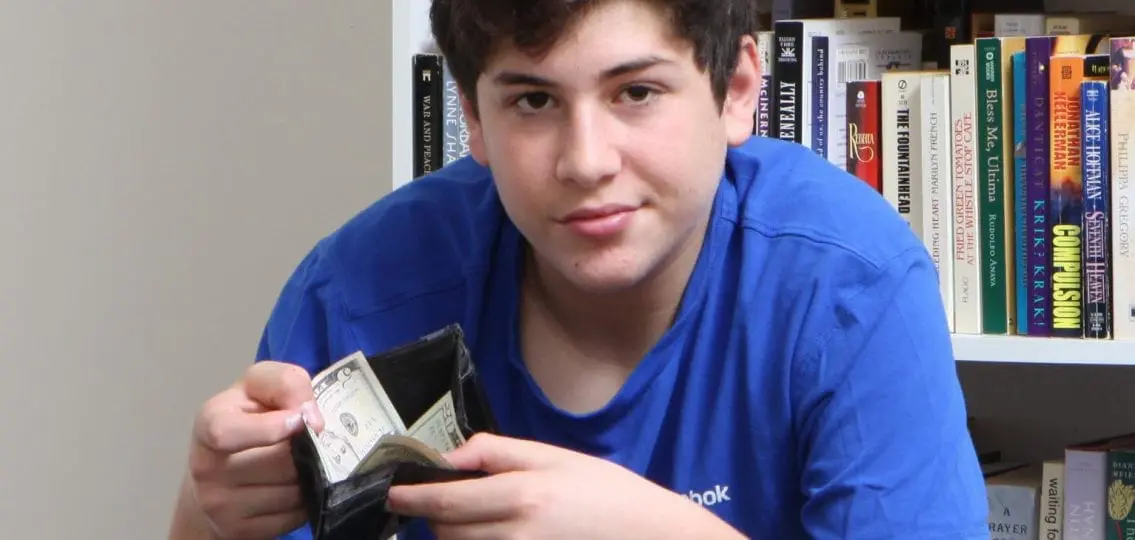Do you ever feel like your teen has more expendable cash than you? Having a part-time job, an allowance, and occasional birthday cash infusions without a mortgage or grocery bill can add up to lots of extra cash.

It’s good for kids to realize early on that there are expenses in life other than pizza and video games. Savvy parents will have their kids pitch in almost as soon as they start earning their own money. But it can be hard to decide what expenses your teens will cover and how to broach the topic. Here’s some advice to make it work in your house.
Teen Expenses: Have Them Pay Early and Often
“Your money is your money; you are not the bank,” Susan Beacham, CEO of Money Savvy Generation, advises parents. “The only way kids will understand and appreciate your support or resources is if they themselves have been accountable to take care of a want or need in their life.”
That’s the approach that Shauna Sisson of Dallas has taken with her kids, CJ, 15, and Jenna, 12, since they were “too young to know it,” she says. “We have split all the gift and chore money and given them half to spend and put half in a car fund, which we will match.” Along the way the kids have paid for such items as iPads, American Girl dolls, and other purchases that Sisson terms “ridiculous.”
Start before kids are making their own money, advocates Amy McCready, founder of Positive Parenting Solutions and author of The ‘Me, Me, Me’ Epidemic.
Provide a lump sum and let them practice making it last so they can learn to budget. Start off with lunch money and entertainment, and then add clothing and gifts as they become better at thinking through their expenses.
“They will probably exceed the money you’re giving them at first, so then they can learn how to cover that shortfall,” she says. Maybe if they blow their lunch money, they have to bring lunch from home for the rest of the month.
Decide What They Should Pay For
Pauline Kummerman of Portland, Oregon, always made it clear what expenses her four kids had to cover, from meals out and activities with their friends to buying gifts and clothing or shoes outside of a designated budget. “We gradually increased their responsibility based on how many hours they were working,” she says, adding that three of her four are now out of the house and appreciate the skills they learned. “They can budget and save and have learned how to get the best bargain.”
Beacham has found that parents get into trouble when they approach the topic in the heat of the moment, after reaching frustration as they watch their teen spend with reckless abandon. “They’ll finally say, ‘Forget it! You’re on the hook!’” but, as Beacham points out, then it’s punitive rather than instructive.
She recommends beginning the discussion early, reminding them in January that they’ll be responsible for their summer activities or half of the pricey summer camp and talking about how they might save for it. During high school, begin talking about what expenses they’ll handle in college so they have four years to prepare.
Beacham has found that teens won’t complain when they have fair warning, and advocates detailing their responsibilities in writing so it’s concrete. “Kids are hoping we will forget,” she says.
“You have to stand firm once you’ve established who’s responsible for what, since it’s easy to give in when they start badgering.”
Reframe the Conversation On Teen Cash
“The message should be that managing money is a privilege and my parents see me as responsible enough to handle it,” Beacham says. “When you pay for everything, you are undermining your teen by not giving them any control.”
Marketing is key, believes McCready. “Emphasize that they are growing up and this is a skill they need to learn,” she says. “Tell them, ‘You used to ask us when you needed something, but now we’re going to give you your own money so you can learn to spend wisely, save, give charitably, and make smart decisions.’”

Beacham points out that the goal is more than making sure they appreciate what you have given them. You are setting them up for a healthy financial future. “Talk to your child about money as often as you would any critical life skill,” she advises. “The way they manage money has a direct effect on their relationships, their ability to secure an apartment and job, and being a productive citizen.”




